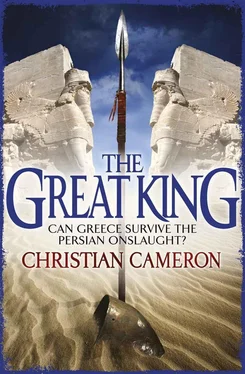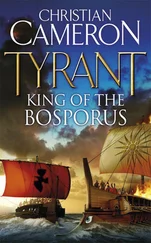Christian Cameron - The Great King
Здесь есть возможность читать онлайн «Christian Cameron - The Great King» весь текст электронной книги совершенно бесплатно (целиком полную версию без сокращений). В некоторых случаях можно слушать аудио, скачать через торрент в формате fb2 и присутствует краткое содержание. Год выпуска: 2014, ISBN: 2014, Издательство: ORION, Жанр: Исторические приключения, на английском языке. Описание произведения, (предисловие) а так же отзывы посетителей доступны на портале библиотеки ЛибКат.
- Название:The Great King
- Автор:
- Издательство:ORION
- Жанр:
- Год:2014
- ISBN:9781409114161
- Рейтинг книги:3 / 5. Голосов: 1
-
Избранное:Добавить в избранное
- Отзывы:
-
Ваша оценка:
- 60
- 1
- 2
- 3
- 4
- 5
The Great King: краткое содержание, описание и аннотация
Предлагаем к чтению аннотацию, описание, краткое содержание или предисловие (зависит от того, что написал сам автор книги «The Great King»). Если вы не нашли необходимую информацию о книге — напишите в комментариях, мы постараемся отыскать её.
The Great King — читать онлайн бесплатно полную книгу (весь текст) целиком
Ниже представлен текст книги, разбитый по страницам. Система сохранения места последней прочитанной страницы, позволяет с удобством читать онлайн бесплатно книгу «The Great King», без необходимости каждый раз заново искать на чём Вы остановились. Поставьте закладку, и сможете в любой момент перейти на страницу, на которой закончили чтение.
Интервал:
Закладка:
‘Rowers to your cushions!’ I called. ‘Marines forward! Ka!’
He held up a thumb and pointed with an arrow.
Hermogenes took a deep breath.
I could see his fear, and he, no doubt, could see mine.
‘Everyone ready!’ I called.
I knew the plan. After all, Themistocles, for all his failings, was a genius. And Eurybiades, for all his caution, was a Spartan.
The bronze aspis in the centre of the fleet flashed three times.
I thumped my spear’s saruater into the deck hard enough to put a small hole in the planking and shouted, ‘Row!’
And while I pulled down the cheek plates on my helmet, the allied fleet went over to the attack.
The Persians weren’t a Persian fleet. I doubt that there were fifty Persians aboard six hundred ships. There were Carians, and Phrygians, and Ionians and Aeolians and Samians and Paphalogians and Syrians and Phoenicians and Carthaginians and Aegyptians, but they were so very large that they weren’t really a fleet. They were really six fleets under six very powerful Persians, and not a one of those powerful men spoke the language of the trierarchs and navarchs under him.
Not a one of them expected us to attack.
And suddenly, on a majestic scale, it was the battle of the day before. No lines, and every trierarch forced to make his own decisions.
Lycomedes made the first kill. He was the first ship out of the circle, his rowers straining like hounds, and he struck a Cypriote, the King of Salamis’s ship — shattered the enemy oar bank, and his marines stormed the ship in a hundred beats of a hoplite’s heart.
The enemy collapsed in chaos. We took forty ships in as long as it would take for the assembly to vote on something routine — Hermogenes misjudged our little trick, and we sank a Syrian trireme, our bow climbing so high out of the water that I was terrified that we’d capsize, and we lost a marine over the side and he sank away into the depths, armour sparkling. That was grim, but the enemy fled like whitefish from tuna.
And it was more than flight. A Lemnian and a pair of Lesbian ships deserted as soon as we struck — raised their oars. The Lesbians were from Eressos and Mythymna — ancient enmies of Mytilini, and thus willing enough to side with us. The Lemnian attacked a Phoenician to show his true intent.
I knocked my son down and refused to let him board our second engagement. I had ordered him to stay behind, and he had boarded with the oarsmen, and his wound was open, his thigh bleeding on my deck.
‘You fool,’ I said, but the blood from my hand wound was falling in quick drops on his blood on the deck, and he gave me the mocking glance of the young man who detects the hypocrisy of the old.
Fair enough, my son.
That was a glorious day for Greece. Lydia fought four ships and took one, killed one, and the other two fled and my oarsmen were, in truth, too tired to run them down and take them. As the sun began to set, they broke.
As they fled from us, they still outnumbered us about four to one.
But they were not cowards. Many of them were skilled sailors, fine marines, and we’d humiliated them without sinking their ships. We were not done.
But we won. And winning is a tonic, in war. We had their measure. Our tactics were good, and though the navarchs all knew that the surprise explosion out of the wheel wouldn’t work again, we nonetheless knew we could handle them. In fact, we were not the worse sailors, the worse oarsmen. Victory proved we were better — or made us better.
I never doubted. Oh, I was terrified, fearful, apprehensive — but I’d sunk and taken enough Phoenicians and Aegyptians and Carians over the years to know that Greeks can handle an oar as well as any man.
We went back to the beaches, and Eurybiades proved he was a better man than Miltiades. He gathered all the trierarchs — two hundred and seventy-one, as we had not lost a ship — and got silence despite our restive joy. He crowned Lycomedes for being the first to score a kill, and then he hopped up on the rostrum I’d had built.
‘Listen, you fools!’ he said. That got our attention.
‘They will be back tomorrow, determined to avenge the humiliation of today. They still have a squadron behind us — as big as our own. The last thing I need — that Greece needs — is for you to celebrate victory. By this time tomorrow, a third of you may be dead.’ He looked around. We stood in the torchlight, and we knew he spoke the truth.
‘A cup of wine per man — a libation for Poseidon and all the gods — and then to your cloaks. That is my command.’
We obeyed the way boys obey a schoolmaster. Even Themistocles.
I confess I had several cups of wine. Every time I saw Brasidas out of the corner of my eye, I had to pound him on the back — I hugged Sekla after the action, and he blushed.
Giannis’s fine light trireme had burst its seams, so we replaced it with one of the heavy captures — the blue Carian. So men had to stay up caulking and making her all shipshape.
But when Orestes rose, I went to sleep. I noted as I wedged myself between Hipponax and Hector that Hipponax did not have a fever, his leg wasn’t hot, and the east wind was steady.
Morning was leaden grey, and the east wind was steady with fitful gusts that cracked the awning like whips and shot whitecaps over the sea to the north.
Every Plataean groaned. Wounds hurt, and abrasions were raw, and some men had two days of terror to overcome.
I stood in the wind on the headland during the morning sacrifices of the priests and priestesses, and made my decision with the help of the Huntress, and then I groaned my way down the rocks to the beach, gathered my crew, and took Lydia to sea.
My oarsmen didn’t even groan. That took too much energy.
Forty stades across the strait to Aphetae. I put a small boat up my mainmast with two men in it, but they took too much of the gusting wind, swayed like a tower about to fall and threw the ship off course, so I brought them down. I had all the sails laid to the guards on the hemiola deck, ready to run up the masts.
I tried the boat sail, and it eased the rowing. The gusts could head her, but the main force of the wind came broadside. Triremes do not sail well at the best of times, and we were making so much leeway that we might have ended in Thermopylae, but every so often I’d take in the sails and row.
The Great King’s fleet was on the beach. I saw them from six stades out, and not a ship was stirring.
I ran all the way down the beach, east to west, across almost thirty stades of beached ships, and no one offered me a fight.
I remember that, as we passed the headland at Aphetae itself, Brasidas whistled. The Spartan was smiling.
I was smiling too.
We ran a little too far west, because the wind pushed us that way — so my oarsmen, now awake enough to grumble, had to start rowing us back up the channel to Artemesium. I was tempted — sorely tempted — to run down to Thermopylae and see the king, but the Persian camp was under my lee and the wind was strong, and if it kept up for a day, I could be cut off from the fleet. I was like Cimon a week before — I didn’t think the fleet could spare me, and besides
. . I didn’t want to miss the greatest victory since Troy.
From the stern, as we turned, took down our sails and started to row, I could see the fires of the Great King’s army — the little student of Heraklitus in my head started trying to calculate the firewood I was seeing burned, because the campfires were like cabbages in a farmer’s field, a big field that runs off as far as the eye can see.
As I looked under my hand, I caught a glimpse of sails to the south in the main channel, just exactly between Euboea and the mainland. I was rowing east into the wind, and they were sailing north on a broad reach, so that for the next whole leg, they were gaining on me as fast as a big boy catches a little one.
Читать дальшеИнтервал:
Закладка:
Похожие книги на «The Great King»
Представляем Вашему вниманию похожие книги на «The Great King» списком для выбора. Мы отобрали схожую по названию и смыслу литературу в надежде предоставить читателям больше вариантов отыскать новые, интересные, ещё непрочитанные произведения.
Обсуждение, отзывы о книге «The Great King» и просто собственные мнения читателей. Оставьте ваши комментарии, напишите, что Вы думаете о произведении, его смысле или главных героях. Укажите что конкретно понравилось, а что нет, и почему Вы так считаете.












